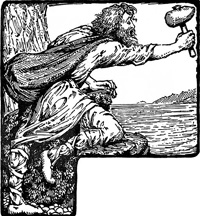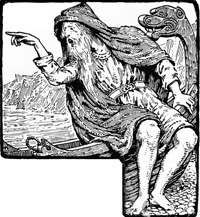 A rank of mountains stood behind Thor. Some were like upturned ships, some like unfinished pyramids and monstrous cones with their tops sawn off, and none of them were smiling. Thor strode west over the tundra, and the sun kept pace with him. Then late in the morning he left the wilderness behind and hurried across scrub and undulating land.
A rank of mountains stood behind Thor. Some were like upturned ships, some like unfinished pyramids and monstrous cones with their tops sawn off, and none of them were smiling. Thor strode west over the tundra, and the sun kept pace with him. Then late in the morning he left the wilderness behind and hurried across scrub and undulating land.
So he came to a sound, a swift deep channel. The air was utterly still there. The sun placed a dazzling hand on the water, and the water seemed barely to move as it moved.
On the far bank a figure sprawled in the midday sun, and his flat-bottomed boat lounged beside him,
“Hey!” bawled Thor, and the water quivered. “You over there. Are you the ferryman?”
The figure stirred and sat up. He cupped his hands. “Who is that oaf yelling over the water?”
“Ferry me across,” called Thor. “I’ll pay you well from this pannier.”
Thor eased his thumbs under the shoulder straps. “It’s packed out with fine fare, and I’ve eaten as much as I can already. I had a glut of herrings and a pool of porridge before I set out.”
 The ferryman slowly got to his feet and pulled his hat well down over his head. “You’re pleased with yourself, aren’t you? Ah! If only you knew what lies in store for you. When you near home, you’ll hear nothing hut moans. Your mother is dead.”
The ferryman slowly got to his feet and pulled his hat well down over his head. “You’re pleased with yourself, aren’t you? Ah! If only you knew what lies in store for you. When you near home, you’ll hear nothing hut moans. Your mother is dead.”
“My mother dead!” cried Thor. He screwed up his eyes; he screwed up his whole face. “What grief could be greater?”
Having alarmed and upset the credulous Thor, the ferryman began to insult him. “Barefoot,” he called scathingly. “Beggar’s clothes. Not even breeches. I doubt if you even have a place you can call your own.” “Bring over your boat,” roared Thor. “No need to be afraid: I’ll guide you in. Anyhow whose ferry is that?”
Now the ferryman took his time; he turned his back on Thor to taunt him, and smiled grimly.
“Whose ferry is that?” repeated Thor. “Hildoll, thy slaughtering wolf, entrusts it to me. He’s a wise man. He lives on Rathsey, the Isle of Counsel. And he has given me my orders: no pilferers, no horse thieves; only worthy men and well known faces. “So,” said the ferryman, “if you want to cross here, tell me your name.”
“I’ll tell you,” shouted Thor, “though I stand alone. I am Odin’s son. I am Meili’s brother, Magni’s father, strongest of the gods. You, ferryman, you’re talking to Thor.” The god’s words made waves on the sound; they ran straight across the channel and broke at the ferryman’s feet. “And who are you, I’d like to know?” shouted Thor. “Tell me your name, ferryman.”
“My name is Harbard; I seldom hide it.”
“Why should you hide it? Or am I talking to an outlaw caught up in some feud?”
“What if you are?” retorted the ferryman. “Unless I’m fated, I can look after myself against the likes of you.”
Thor clenched his right fist, rubbed it against his beard and stared at the cold water. “You’re not worth the trouble of wading across this channel and getting soaked up to the waist. But I’ll repay you, you knock-kneed ferryman, when I get across this sound!”
Harbard put his hands on his hips. “Here I stand and here I’ll wait. You’ve not met my equal since you fought Hrungnir.”
“You want to talk about Hrungnir, do you? That lolloping giant, do you know his head was made of stone? And yet I killed him, I laid him out lifeless. And you, Harbard, what were you doing meanwhile?”
“I spent five winters with Fjolvar on the island of Algron. There was plenty to do. There we fought. We sank our shafts into heroes and virgins.”
Thor rubbed his beard again. “How did you win them, your women?” “They welcomed us with good grace; yes, with high spirits. And they were well advised to do so, for they could no more have escaped us than make ropes of sand or dig the bottoms out of valleys.” Harbard opened his arms. “I was the one they turned to first. I slept with seven sisters, and each one gave me ecstasy. And you, Thor, what were you doing meanwhile?”
“I killed the fierce giant Thiazi and hurled the eyes of Alvaldi’s son into scalding heaven. They bear witness to my feats; everyone can see them. And you, Harbard, what were you doing meanwhile?”
“I enticed night riders front their husbands, I wrought love craft with those witches. And that giant Hlebard, he was not made of straw; he gave me a magic branch, and I whipped his wits off him.”
“So,” called Thor, “that’s how you repay a generous gift.”
The grey-bearded ferryman shrugged. “The oak,” he shouted across the shining water, “grows strong on shavings from all sides. Each man for himself. And you, Thor, what were you doing meanwhile?”
“I journeyed east to Jotunheim. I slaughtered slovenly giant women as they shambled Over the fells. If they were still alive, there would be a terrible throng of giants and no men in Midgard. And you, Harbard, what were you doing meanwhile?”
“I was the cause of war in Yalland, the land of slaughter. I set princes at each other’s throats. I thwarted peace.”
Thor looked at the ferryman. He listened: his brow was creased in thought.
“After they’ve fallen in the fight,” shouted Harbard, “the nobly born journey to Odin. But Thor, he caters for a great gang of thralls.” “I see how even-handed you’d he in your gifts of men to the gods; retorted Thor. ‘Not that you’ve any say in the matter.”
“Your limbs are strong but your heart is faint,” jeered the ferryman. “Such was your fear, you were glad enough once to crawl into a glove, and there you forgot your name. Thunderer? You were so scared Fjalar might hear you that you didn’t dare fart or sneeze.”
“You womanish ferryman! I’d swipe you straight down to Hel if I could reach Over this sound.”
“Why bother?” said Harbard, with a voice like oil. “We have no quarrel. And vou, Thor, what did you do next?”
“Away in the east, I patrolled the bank of the Iving. Svarang’s sons tried their luck there.” Thor suddenly stooped, and in one movement picked up a block of stone and hurled it over the sound. It whirred as it flew.Harbard stepped hurriedly out of the way and the boulder buried itself in the bank beside him. “Like that!” yelled Thor. “They threw boulders; much good it did them! Then they begged for a truce. And you. Ilarbard, what were you doing meanwhile?”
“I was in the east, too, and came to a certain understanding. I turned the head of a linen-white maid, and we met in secret. I aroused that lady, wearing gold ornaments, and then I enjoyed her.”
“A woman well found,” said Thor.
“I could have done with your help,” called Harbard, “to hold that white maid down.”
“I wish I’d been with you,” shouted Thor eagerly. “I’d have been only too ready.”
“And I’d have trusted you,” said Harbard evenly, “if you were not known for breaking promises.”
“No!” called Thor. “That’s not true. I’m no heel-biter, like an old leather shoe in spring.”
“And you, Thor, what were you doing meanwhile?”
“I was on Hlesey, the island of the sea god. I slew the brides of the Berserks. They were depraved serpents.”
“Thor, you brought shame on your head,” said Harbard scathingly, “you ladykiller”
“They were more like wolves than women,” protested Thor. “They attacked my well trimmed ship and threatened us with iron clubs; Thialfi ran awe. And you, Harbard, what were you doing meanwhile?”
“I was one of the host that came to Asgard’s frontiers to raise our banners and redden our spears.”
“Are you telling me that you meant to fight the gods?”
“I’ll give you a little finger-ring and then you won’t fret,” said the ferryman, mockingly. “It will be a peace-maker between us.”
Thor was enraged. He kicked at the bank and a hailstorm of grit and pebbles ripped the silken water. He gripped Mjollnir in his huge fist. “Where did you dredge up such filthy abuse? I’ve never heard as foul an insult.”
“I learned it from men, age-old men who live in the hills of home.” Thor shook his head in anger and envy. “That’s a fine name for barrows: hills of home.”
“That’s what I call them.”
“And your sharp tongue will be the end of you if I choose to wade across this river,” shouted Thor. “You’ll howl more loudly than a wolf if I hit you with this hammer.”
Harbard replied all the more swiftly. “Your wife, Sif, she’s doing some entertaining. She has a lover. Keep your strength for him: that would be more to the point.”
“You witless fool!” roared Thor. “Shut your mouth and keep your stabbing tongue inside it. You’re a liar!”
The ferryman paused and with his one eye peered into the shining water that stops for no man. “No,” he called. “I’m telling the truth. Anyhow, how long you’re taking to get home! You’d be well on your way by now if you’d crossed in this boat.”
“You womanish ferryman! You’ve kept me waiting for much too long.” Thor paced up and down the bank of the sound, now swinging round and changing direction, now glaring across the water, like a caged animal. The ferryman watched him. “I never thought a mere ferryman could detain Asathor.”
Thor’s eyes were blazing and he gave a great bellow that rang round
the sky. “Here’s some advice: row your boat straight over: keep your mouth shut; and set down Magni’s father on the far bank.”
“Go away!” retorted Harbard. “I’m not rowing you across.”
Thor bent over the swift cold water. He saw himself in it, and saw, too, how the ferryman had toyed with him and how, for once, his strength was no use to him. He lifted his head and thrust out his red beard. “If you won’t ferry me over,” he called, “at least tell me the way round.”
‘Few words but many miles: replied Harbard. ‘Over stock and over stone. “take the track on your left until you come to Midgard; and there you’ll find your mother, Fjorgyn. She’ll show you the way to the trembling rainbow that brings men to Asgard.”
“Can I get home today?” asked Thor.
“Walk fast, don’t rest, and you might be back before sunrise.”
“We’ve talked long enough,” said Thor angrily. ‘You do nothing but mock me: He turned, and then looked back over his shoulder. “If we ever meet. I’ll pay you in full for refusing me this ride.”
Thor strode away, furious and scorned. And as he went, the jeering laugh of the ferryman followed him. And then Harbard’s words: “Get lost! Let every evil being have you!”
The god quickened into the vast grey wasteland. There was sandstorm in the wilderness. The wind unwound it, a long scarf leading into the lee of the indigo mountains.

Leave a Reply